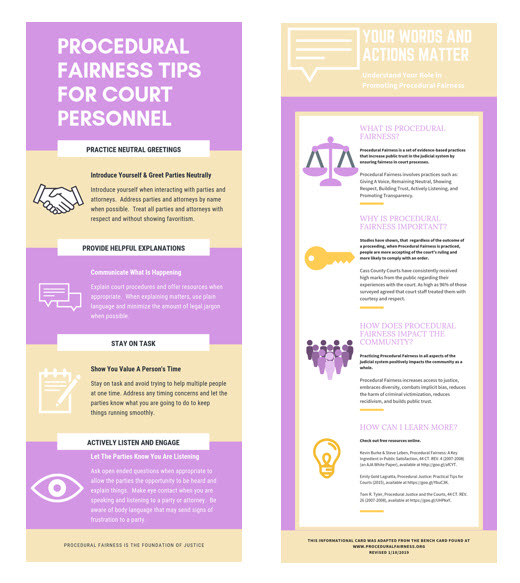From September 2018 through February 2019, a group of Cass County court leaders participated in the Michigan Judicial Institute’s Court Leadership Team Academy (CLTA). This group included Chief Judge Susan L. Dobrich; Probate Register Kelley James-Jura; Deputy Friend of the Court Sarah Mathews; and me. As a result of the CLTA, our Court Leadership Team developed a procedural fairness project.
“Procedural fairness” means the perceived fairness of court procedures and court personnel’s treatment of individuals. Customers come into our courts looking for solutions to complex problems and answers to difficult questions. How we interact is just as important as each individual outcome.
The purpose of our procedural fairness project is to promote
increased awareness, understanding, and use of procedural fairness practices in
the court system through targeted education of key groups of individuals. We identified six concepts to increase our
court’s understanding of procedural fairness:
- Respect. Treat all with courtesy; make eye contact; explain what is happening; and give customers our full attention;
- Voice. Allow litigants to be heard; provide meaningful participation;
- Listen. Slow down and be silent (tuning out distraction); take time to hear what litigants are saying; and observe litigants’ body language;
- Neutrality. Be fair and unbiased; give the same message to both sides; and guard against favoritism;
- Trust. Be sincere and caring; take the time necessary (treat each case like it’s the only one); and explain factors that impact the interaction;
- Transparency. Be clear to all how decisions will be made; explain procedures and processes; and avoid legal jargon.
We designed a logo showcasing these six concepts.
We are mindful that training is a process, and that we need to
pursue this project as a progression of small changes that can make a big
difference. We can’t change our system
overnight. We have to approach this
project as a progression from where we are at now to where we can be in the
short term and in the long term. Our plan
is to support and fulfill our project’s purpose over the course of three project
phases.
Phase One involves training our court staff about procedural fairness.
We have two trainings scheduled during
the fall of 2019. At the training, we
will present court staff with our procedural fairness job aid cards, which will
be good reminders of how we can incorporate procedural fairness into our daily
interactions with our court customers.
Phase One also involves training with the judges. We have developed an informational graphic procedural fairness job aid card for the judges, too.
Phase Three will focus on our community. By Phase Three, we will have our new website
for all of the courts up and running. This
will provide us with a forum for providing information and resources to promote
procedural fairness with links to videos and other online resources about
procedural fairness that can be used by the public and our court staff. We are also working on creating a Procedural
Fairness Calendar that incorporates an important procedural fairness concept
for each month that can then be unveiled in Phase Three for distribution to the
public and courthouse staff.
At the end of Phase Three, we plan to host a follow up training
for court staff to touch base with them on questions they may have about
applying the six key procedural fairness concepts to their daily tasks and to
review with them the material available on the court’s website.
We are looking forward to rolling out our Procedural Fairness Project.
Carol Montavon Bealor, J.D., received
her bachelor’s degree in Government and International Studies from the
University of Notre Dame and her Juris Doctor degree from Valparaiso University
School of Law. She currently serves as
43rd Circuit Court Administrator and Friend of the Court Director.






